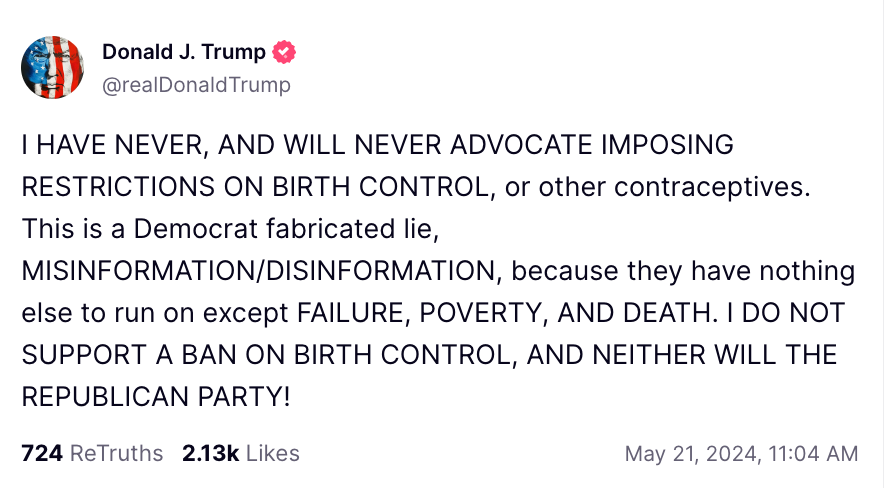
After Roe v Wade was overturned in 2022, the necessity of free and accessible contraception has been a near-constant talking point.
But the cost of contraception in the US is higher than you might think. Indeed, contraception accounted for 30-44 percent of out-of-pocket healthcare costs for women before it was covered by the ACA, according to Planned Parenthood.
And now that Donald Trump has won the 2024 presidential election, nothing is certain when it comes to healthcare.
If the ACA — otherwise known as Obamacare — was overturned, over 62.4 million women would find themselves without access to no-cost birth control, according to the National Women’s Law Center (NWLC); and 48 million women would lose access to free emergency contraception.
At the Trump-Harris debate in Pittsburgh in September, Trump admitted that he had the “concepts of a plan” for healthcare policy to replace the ACA, but nothing concrete.
Earlier in May, Trump said he was “looking at” policy to restrict contraception access in some states, before backpedaling on Truth Social.
He tried to calm the waters before Election Day and posted on social media platform X. “Lyin’ Kamala is giving a News Conference now, saying that I want to end the Affordable Care Act,” he said. “I never mentioned doing that, never even thought about such a thing.”

There are concerns that, while Trump has distanced himself from it, Project 2025 — the 900-page policy document from former Trump aides and a right-wing think tank — suggests that the emergency contraceptive (morning after) pill is a “potential abortifacient” and should not be considered contraception under the ACA.
The right-wing blueprint also recommends that the Health Resources and Services Administration (HRSA) should eliminate coverage of emergency contraception altogether under its preventive guidelines.
With an explicit anti-abortion agenda throughout the proposals, Project 2025 also suggests that the Department of Health and Human Services (HHS) should “[r]eturn to being known as the Department of Life by explicitly rejecting the notion that abortion is health care and by restoring its mission statement under the Strategic Plan and elsewhere to include furthering the health and well-being of all Americans ‘from conception to natural death.’”
The slide from abortion bans to contraceptive restrictions is far from over. The Heritage Foundation — the right-wing think tank that authored Project 2025 — appears to stand against all recreational sex.
A video posted on their X (Twitter) account asserts that removing the “senseless use of birth control pills” would “[return] the consequentiality to sex”.
"It seems to me that a good place to start would be a feminist movement against the pill, & for... returning the consequentiality to sex."
— Heritage Foundation (@Heritage) May 27, 2023
Conservatives have to lead the way in restoring sex to its true purpose, & ending recreational sex & senseless use of birth control pills. pic.twitter.com/yq5uxJN0WJ
As president, Trump reduced access to contraception for lower-income people by cutting funding for the Teen Pregnancy Prevention Program and bringing in restrictions on the Title X program.
He also successfully weakened women’s ability to receive free contraception under the ACA. In 2020, the Supreme Court approved exemptions which would allow employers to deny coverage for birth control for religious or moral objections.
Despite this, Trump said on his social media platform Truth Social in May that he would “never, ever advocate imposing restrictions on birth control.”

Last year, JD Vance said on CNN that he doesn’t know “any Republican, at least not a Republican with a brain, that’s trying to take [birth control] rights away from people.”
However, 195 Republicans voted agains the Right to Contraception Act in 2022, which would have recognized the legal right to voluntary contraception.
Before their election defeat, DNC National Press Secretary Emilia Rowland warned that “Trump and Vance [have] unlimited power over our bodies and futures by tearing away access to Plan B and birth control and raising health care costs.”







